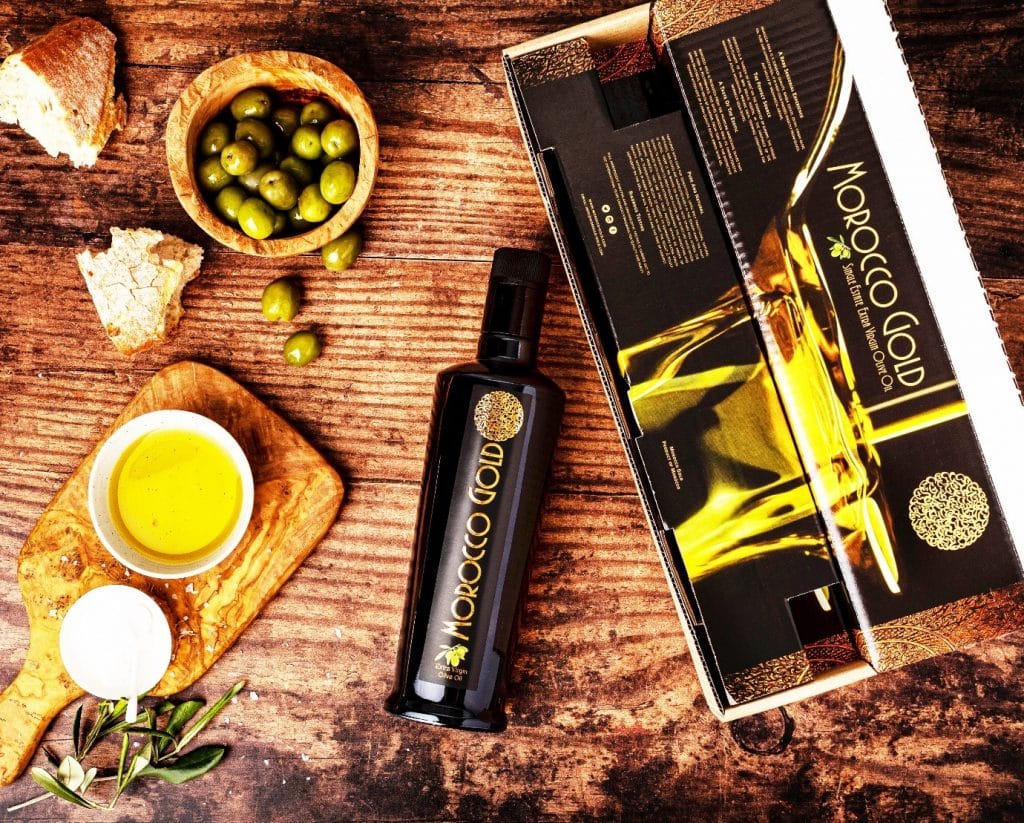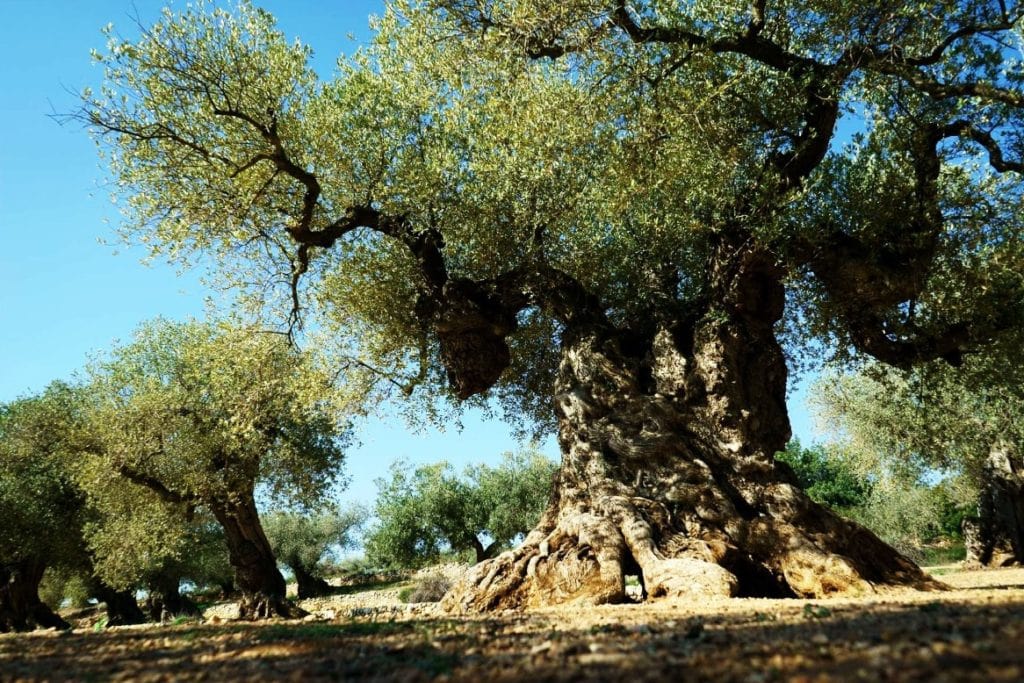Put Extra Virgin Olive Oil Centre Centre Stage on September 30th
If you are looking for a great reason to treat yourself to a bottle of our outstanding new harvest of Morocco Gold, then look no further than September 30th – also known as Extra Olive Oil Day.

Contents:
- Celebrate Extra Virgin Olive Oil Day In Style
- History Of Extra Virgin Olive Oil
- Health Benefits of Extra Virgin Olive Oil
- Cooking With Extra Virgin Olive Oil
Celebrate Extra Virgin Olive Oil Day In Style
Extra virgin olive oil day is a celebration of one of the healthiest and most versatile ingredients in any kitchen. But if you’re going to mark the occasion, why not do it in style? By choosing the best quality olive oil you can find, you’re making a conscious lifestyle choice that could have a real impact on your health and wellbeing. Whether you’re using it to dress a salad or to add richness to a pasta dish, high-quality extra virgin olive oil is a delicious and nutritious addition to any meal. So this extra virgin olive oil day, don’t settle for anything less than the best. Take your cooking and your health to the next level by choosing the finest oil you can find.
History Of Extra Virgin Olive Oil
Olive oil has been around for centuries, and its origins are fascinating but was the humble olive originally used for something other than olive oil for consumption? Fossil evidence indicates the olive tree had its origins some 20-40 million years ago in the Oligocene era. Evidence of the first olive cultivation has been found on the border between Turkey and Syria, in the period around 6000-8000 years ago. A recent DNA study of fossilized pollen has helped to narrow it down to this period.

For thousands of years olive oil main function was for lighting lamps rather than culinary use. Edible olives seem to date back to around the Bronze age (3150 to 1200 BCE). Over the ages the cultivation of olives and olive oil pressing managed to decrease the bitterness in olives and olive oil, also increase production.
Inventory logs carried by ancient trading ships dating back to around 4,000 BCE contain the first written records of olive oil, which was transported through the Mediterranean area from one port to another.
Students of Olive Oil history can show that as far back as 3000 BC, olives were grown commercially in Crete and olive oil may well have been the source of the wealth of the Minoan civilization. An olive tree near the Palace of Knossos on Crete is reputed to be around 4,000 years old.
The first great expansion of olive cultivation seems to be around Greece and Egypt around 1,700 BCE.
Around 1,000 BCE the Phoenicians are thought to have brought olives to Spain and Northern Africa.
The expansion of the Roman Empire in around 900 BCE was key to olive oil and its uses. The Roman Empire expanded its civilization throughout southern Europe and North Africa, bringing with it olive trees to all conquered territories. As an important commodity, the Romans made many improvements in olive tree cultivation, olive oil extraction and storage – and valued olive oil to such an extent that it was even accepted as payment for taxes. Production increased greatly and olive oil became most popular. More olive mills were built as this culinary staple became increasingly popular.
The decline of the Roman Empire in 500 A.D. brought with it a decrease in olive cultivation and a reduction in olive oil use.
Around 1,110 AD olive groves begin to flourish once again, particularly in Italy, thanks to the merchant class who discovered that selling olive oil in local markets was an important source of income. During this time, Tuscany becomes a renowned region for the cultivation of olive trees.
Olive Oil In Modern History
The continued production and use of quality olive oil in modern history points primarily to the Renaissance, where Italy becomes the largest producer of olive oil in the world, renowned for its rich and flavourful oils that graced the tables of nobles and royalty throughout Europe.
Spanish colonists brought the olive to the New World in the 16th century where its cultivation prospered in present-day Peru and Chile. Olive tree cultivation quickly spread along the valleys of South America’s dry Pacific coast where the climate was similar to the Mediterranean.
Spanish missionaries established olive trees in the 18th century in California. It was first cultivated at Mission San Diego de Alcalá in 1769 or later around 1795.
Around 1,800 AD, olive oil makes its commercial debut in the Americas as Italian and Greek immigrants demand its import from Europe.
Health Benefits of Extra Virgin Olive Oil
There is no shortage of information about the health benefits of extra virgin olive oil on our dedicated news blog. But we love any opportunity to remind you of the top line stuff. So, in no particular order, here are the top five health benefits of evoo – worth celebrating too, we think!
- Can Help Combat Cancer
- Can Improve Your Heart Health
- Can Help Reduce Inflammatory Diseases
- Can Help Protect Your Digestive System
- Can Help You Maintain A Healthy Weight
Cooking With Extra Virgin Olive Oil
One of the reasons Extra Virgin Olive Oil is special enough to have its own day of celebration is because it is one of the most versatile foods going!
Olive oil is an integral part of cooking in cuisines all over the world. It’s incredible at absorbing and carrying other flavours, as well as teasing out and amplifying the taste of other ingredients that are cooked in it. Almost all recipes these days begin by drizzling oil into a pan, and invariably they call for olive oil – that quintessential Mediterranean ingredient which is fruity, peppery, complex and rich all at once.
For whatever reason, however, many home cooks believe evoo (the cold-pressed, higher quality, more flavourful oil) should only be used in its raw state or for finishing dishes. The myth that heating or cooking with extra virgin olive oil destroys its flavour or makes it unhealthy has been floating around for years now, but there’s no real evidence behind the belief.
To understand the potential of extra virgin olive oil for cooking and as a core ingredient in a rich and varied diet, we need look no further than kitchens and traditions of The Mediterranean. With its emphasis on vegetables, whole grains and healthy oils like evoo, The Mediterranean Diet has reach something of celebrity status across the world for decades now. But just how can I incorporate a high quality evoo in to my own cooking habits?
Possibly one of the most basic questions to start with and the answer is a simple YES! Morocco Gold extra virgin olive oil is incredibly versatile, to have on its own also as an excellent cooking medium and a flavouring ingredient. It is becoming more and more popular as a dressing for salads and pasta, for finishing cooked dishes and for dipping with bread and raw vegetables before a meal.
